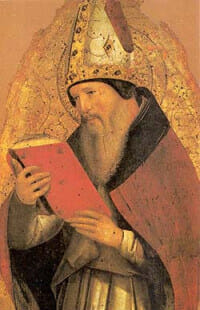Born in North Africa to Roman and Berber parents, Augustine (354-430 CE) was a man of brilliant mind and passionate heart.
As a fiery student at Carthage, and as a restless teacher in Africa and then Rome, he searched for understanding of life’s meaning.
Appointed professor of rhetoric at the imperial court at Milan, he finally found in the sermons of Bishop Ambrose a compelling call to grace and truth. After his baptism in 387 he returned to Africa to live a quiet life of study with like-minded friends. The city of Hippo, however, called him to be bishop.
Augustine’s service as bishop, pastor and scholar greatly influenced subsequent Christian life and thought. His emphasis on grace and the primacy of love in all things, on the reliability of faith and reason in the search for truth, and on our vocation to transform society have had a profound influence on hundreds of seminal thinkers, Catholic and Protestant, medieval and modern, religious and secular. His voluminous writings, especially “Confessions,” “The Trinity” and “City of God,” have set the standards for Christian intellectual and spiritual life. They continue to be read as classics in world literature.
Augustine’s life, thought and work have been the inspiration for the Order of St. Augustine. From their teaching and study at the great medieval universities to their contemporary educational and pastoral ministries, the Augustinian Friars promote learning, charity and community life in the spirit of the African bishop.


